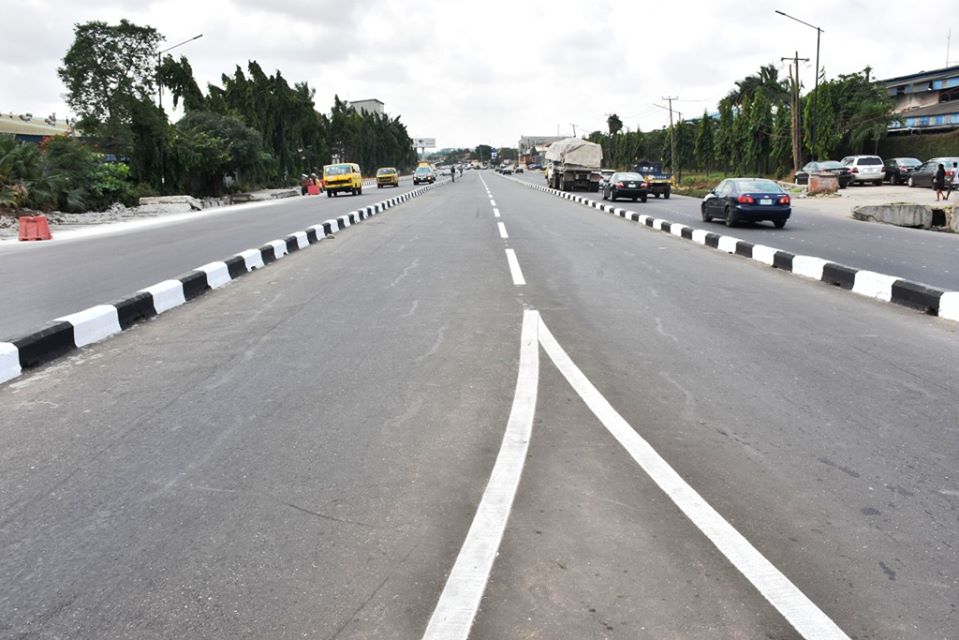Auto
Sanwo-Olu Commissions 13.6km Oshodi-Abule Egba Road

By Modupe Gbadeyanka
The renovated Oshodi-Abule Egba axis on the popular Lagos-Abeokuta Expressway was commissioned on Tuesday by the Lagos State Governor, Mr Babajide Sanwo-Olu.
The transformed 13.68 kilometre-long road now has a Bus Rapid Transit (BRT) corridor in the middle to convey commuters in large number.
The Oshodi-Abule Egba corridor is a major link for residents who commute in and out of Alimosho, Egbeda, Ijaiye, Iyana Ipaja and Oshodi. The route is also a gateway to neighbouring Ogun State and Republic of Benin.
The BRT project was handled and supervised by the Lagos Metropolitan Area Transport Authority (LAMATA), an agency of the state’s Ministry of Transportation.
The new BRT corridor is a median running route with 14 drop-off terminals along the Oshodi-Abule Egba route, which terminates at Katangua Bus Station. Each terminal has well-ventilated foyer where passengers can sit and wait for buses. The route was designed with 11 pedestrian bridges, traffic safety measures and street lighting.
At the commissioning yesterday, an ecstatic crowd of residents filed along the route to welcome the Governor, who rode in a BRT bus to formally flag it off for public use.
He described the event as “a major milestone” in the implementation of his administration’s reform agenda in public transport system, pointing out that the handover of the BRT infrastructure was another promise fulfilled by his administration.
According to him, the transportation asset would create a new travel experience for residents of Alimosho and Oshodi, stressing that the project was specifically designed to improve journey time for commuters, thereby scaling up productivity and life expectancy in the State.
“A little over a year ago, we pledged to significantly improve traffic flow and transportation system which is the very first of our six-point development agenda encapsulated as Project T.H.E.M.E.S. We made the pledge knowing that the people are the main reason we have been entrusted with the management of our commonwealth.
“Today, we are here to formally flag-off a very important public transport infrastructure – the Oshodi–Abule Egba BRT corridor – which officially launches the commencement of transport operation along the BRT corridor.
“We are unveiling 550 high and medium capacity buses which will be immediately deployed for public use. This event also formally inaugurates our upgraded e-ticketing system in fulfilment of our pledge.
“This project is very significant because of its immense benefits to Lagosians in the different communities it straddles and to visitors to our state.

“This new BRT corridor will bring great relief to over 60,000 commuters who will use this facility daily. Travel time, which is estimated at an average of two hours during peak periods, will be significantly reduced to an average of 30 minutes. This will improve the health of our people, engender a safer environment, and increase the value of socio-economic activities in the state,” the Governor said.
Mr Sanwo-Olu said his administration’s reform efforts were geared towards birthing a new commuting order in the state through seamless travel and creating smart mobility model that’ll result in a congestion-free state.
He reiterated that his government remained committed to bringing problem-solving interventions across all modes of the transportation sector in Lagos.
To integrate all transport modes on a single smart payment ecosystem, the Governor launched an upgraded e-ticketing platform that would automate fare payment and create smart mobility through a cashless pre-paid Cowry card.
The e-ticketing mechanism has modern functionalities which simplify the process of bus booking and the ticket purchase. It introduces simple solutions that guarantee seamless cash and wireless payment for passengers at designated booths and will enable passengers to proceed to the loading bay and scan the card for fare deduction.
“With the e-ticketing system, we envisage the use of a single card on buses and ferries and later upscale to the railway’s system when passenger operations commence in 2022. The system promotes a cashless ecosystem, aids personal budgeting and planning and commuters can easily top-up,” he said.
Auto
Heirs to Introduce Low-Cost Motor Insurance

By Modupe Gbadeyanka
There are plans by Heirs Insurance to introduce insurance products tailored for vehicle owners, a statement from the underwriting firm has disclosed.
According to the subsidiary of Heirs Holdings, this low-cost motor insurance package known as the Flexi Comprehensive Motor Insurance Plan will provide the benefit of a comprehensive motor insurance plan for a fraction of the cost, addressing the financial realities many Nigerians face.
The underwriting company announced the plan to introduce this package as it launched a new campaign designed to reward its customers.
This initiative themed Unwrapping Smiles will bring hope to individuals, families, and communities this holiday season, and will run from December 10 to December 31, 2024.
It will feature community-focused outreaches, including Christmas gifts and exciting rewards to put smiles on the faces of Nigerians. It will also include the launch of a holiday-watch web film known as The Underwriters for all Nigerians to enjoy.
“At Heirs Insurance Group, we are committed to providing much more than insurance. In a season when many Nigerians seek hope and reasons to smile, we are proud to offer initiatives that inspire and uplift,” the Chief Marketing Officer of Heirs Insurance, Ms Ifesinachi Okpagu, said.
Auto
FG Claims Investments in Presidential CNG Initiative Now $450m

By Adedapo Adesanya
Nigeria’s Presidential Compressed Natural Gas Initiative (PCNGi) claims that investments in championing the CNG value chain have hit $450 million.
This was disclosed by Mr Michael Oluwagbemi, Project Director and Chief Executive Officer (CEO), PCNGi, during the 9th Edition of the Nigeria Energy Forum (NEF2024) Day 2, Virtual Event themed Energising Sustainable Industrialisation.
According to the PCNGi CEO, the amount goes into things like mother stations, daughter stations and refuelling stations as well as conversion centres which are starting to spring up across the nation.
Mr Oluwagbemi, represented by Mr Tosin Coker, the Head of Commercial, PCNGi, said the initiative had successfully converted more than 10,000 vehicles from petrol to CNG.
“By 2027, the initiative will have converted more than one million vehicles using petrol to CNG,” he said.
On incidents of explosion of vehicles using CNG, the CEO assured Nigerians that it had taken precautionary measures with different agencies of government to ensure safety.
Mrs Ibironke Olubamise, National Coordinator of the GEF Small Grants Programme (SGP), managed by UNDP, said the SGP was investing in youth energy innovation for economic growth and environmental sustainability.
Mr Daniel Adeuyi, NEF Group Chairman, said, “The event featured three super sessions on Energising Industrial Revolution, Community Climate Action by GEF-SGP UNDP and Clean Energy Innovations.
“The sessions are to share lessons learnt from real-life projects and build capacity of young entrepreneurs and cross-industry professionals.”
Mr Joseph Osanipin, the Director General of the National Automotive Design and Development Council (NADDC), said that the council had trained more than 4,000 auto technicians on how to convert petrol vehicles to CNG.
He said the council had started campaigns to sensitise Nigerians on the advantages of using CNG to power their vehicles.
“CNG can guarantee a cleaner environment, it is cheaper and affordable,” he said.
Mr Oluwatobi Ajayi, the Chairman and Managing Director of Nord Automobile Ltd., said the company was established to tackle the growing demand for vehicles in Africa and reduce import dependency.
He said that because of the Federal Government’s CNG initiative, the company had incorporated it into their vehicle production to meet up with the government policy.
Mr Armstrong Tankan, the Managing Director and Chief Executive Officer, Ministry of Finance Incorporated (MOFI), said that MOFI was set up in 1959 as the statutory vehicle to hold all the assets owned by the federal government.
“Today, we’ve been able to identify the assets the federal government owns and we are trying to track them.
‘We actually do have assets, not just locally but globally as well and we must establish visibility over what the federal government owns before we can start talking about managing them.
“So, we want to try to minimise the waste, minimise the overlaps and help to improve output,” he said.
Auto
Dangote Becomes Largest Operator of CNG Trucks With $280m Investment

By Aduragbemi Omiyale
Over $280 million has been invested by Dangote Cement Plc in compressed natural gas (CNG) technology and infrastructure to enhance energy efficiency and drive economic growth in Nigeria.
The cement maker turned to CNG in demonstration of its support for President Bola Tinubu’s drive for cheaper and cleaner fuelling alternatives for all Nigerians.
At a recent event, the President emphasised the urgent need for Nigeria to utilise its vast natural gas resources in the transportation sector.
He stated that CNG transportation is an economic necessity for Nigeria, signalling a significant shift in the country’s approach to public transportation and energy use.
This has spurred Dangote Cement to adopt CNG, reflecting its dedication to mitigating climate change and supporting a transition to a low-carbon economy, making it the largest operator of CNG trucks in the country.
The chief executive of Dangote Group, Mr Aliko Dangote, said his company’s investments in CNG are also in line with Nigeria’s Nationally Determined Contribution (NDC) under the Paris Agreement, which aims for net-zero emissions by 2060.
“In this pursuit of transition to clean energy, we are optimistic of a remarkable accomplishment by President Tinubu, as he has taken the lead in the nation’s drive towards energy efficiency. This presupposes private sector intervention to support this noble idea initiated by the President,” he stated.
The businessman noted that the firm’s early adoption of CNG has made it the largest operator of CNG trucks in Nigeria, emphasising that the initiative is a boost to Mr Tinubu’s quest towards enhancing the nation’s energy independence and contributing to a more secure energy future.
“We are now using CNG vehicles, especially with the new policy of the federal government, launched under the Renewed Hope Agenda by President Tinubu. We are committed to a cleaner and greener future,” Mr Dangote said.
On his part, the chief executive of Dangote Cement, Mr Arvind Pathak, said the cement miller aims to acquire 100 per cent CNG trucks as part of a long-term plan to transition its entire fleet to CNG.
He disclosed that the CNG infrastructure investments have positively influenced Nigeria’s transition to cleaner fuels, adding that the CNG station at Obajana, capable of refuelling over 3,000 trucks, exemplifies this commitment, with a second station currently under development in Ibese to support fleet operations further.
“By mid-2026, Dangote Cement aims to operate a fleet predominantly powered by CNG. To facilitate this transformation, we are investing in expanding our CNG fuelling infrastructure, ensuring that our growing fleet has reliable access to CNG as our fuel,” Mr Pathak said.
He added that plans are afoot to aggressively pursue this timeline of deployment, beginning from the first quarter of 2025, saying, “We are keeping our eyes on the ball to ensure that we do not miss our target dates of full compliance.”
-

 Feature/OPED5 years ago
Feature/OPED5 years agoDavos was Different this year
-
Travel/Tourism8 years ago
Lagos Seals Western Lodge Hotel In Ikorodu
-

 Showbiz2 years ago
Showbiz2 years agoEstranged Lover Releases Videos of Empress Njamah Bathing
-

 Banking6 years ago
Banking6 years agoSort Codes of GTBank Branches in Nigeria
-

 Economy2 years ago
Economy2 years agoSubsidy Removal: CNG at N130 Per Litre Cheaper Than Petrol—IPMAN
-

 Banking2 years ago
Banking2 years agoFirst Bank Announces Planned Downtime
-

 Sports2 years ago
Sports2 years agoHighest Paid Nigerian Footballer – How Much Do Nigerian Footballers Earn
-

 Technology4 years ago
Technology4 years agoHow To Link Your MTN, Airtel, Glo, 9mobile Lines to NIN












